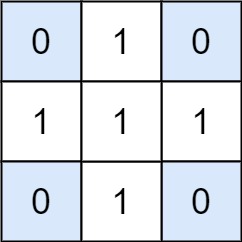Problem
Given a matrix and a target, return the number of non-empty submatrices that sum to target.
A submatrix x1, y1, x2, y2 is the set of all cells matrix[x][y] with x1 <= x <= x2 and y1 <= y <= y2.
Two submatrices (x1, y1, x2, y2) and (x1', y1', x2', y2') are different if they have some coordinate that is different: for example, if x1 != x1'.
Example 1:

Input: matrix = [[0,1,0],[1,1,1],[0,1,0]], target = 0
Output: 4
Explanation: The four 1x1 submatrices that only contain 0.
Example 2:
Input: matrix = [[1,-1],[-1,1]], target = 0
Output: 5
Explanation: The two 1x2 submatrices, plus the two 2x1 submatrices, plus the 2x2 submatrix.
Example 3:
Input: matrix = [[904]], target = 0
Output: 0
Constraints:
1 <= matrix.length <= 1001 <= matrix[0].length <= 100-1000 <= matrix[i] <= 1000-10^8 <= target <= 10^8
Solution
class Solution {
public int numSubmatrixSumTarget(int[][] matrix, int target) {
int rows = matrix.length;
int columns = matrix[0].length;
for (int i = 0; i < rows; i++) {
for (int j = 1; j < columns; j++) {
matrix[i][j] += matrix[i][j - 1];
}
}
HashMap<Integer, Integer> sumMap = new HashMap<>();
int cur;
int res = 0;
for (int i = 0; i < columns; i++) {
for (int j = i; j < columns; j++) {
sumMap.clear();
sumMap.put(0, 1);
cur = 0;
for (int[] ints : matrix) {
cur += ints[j] - (i > 0 ? ints[i - 1] : 0);
res += sumMap.getOrDefault(cur - target, 0);
sumMap.put(cur, sumMap.getOrDefault(cur, 0) + 1);
}
}
}
return res;
}
}
Explain:
nope.
Complexity:
- Time complexity : O(n).
- Space complexity : O(n).